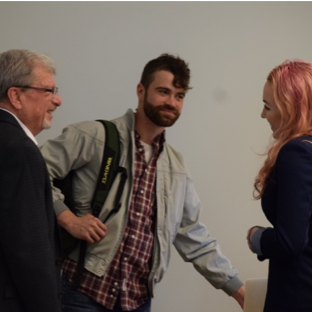Careers in Innovation: Tips

Professional development and network building are essential components of Ph.D. and postdoctoral training. These not only lead to making well-informed career choices, but increase the hiring potential of postdocs and graduate students, no matter what career path they have chosen. The Careers in Innovation Panel, sponsored by the Graduate School’s Careers Beyond Academia/BEST and the Plant Biology Graduate Student Association, provided attendees with both networking opportunities and professional development.
Speakers from diverse careers included Zach Shulman—expert in patent law and management; Julie Baker—software engineer and co-founder of Ursa Space Systems; Devin Craven—director of Research Service Solutions at iFyber; Alice Li—executive director of Cornell’s Center for Technology Licensing; and Peter Salmon—consultant and founder of the International Food Network. Together, these professionals shared tips on how Ph.D. students can best market themselves to different companies; insight into careers in intellectual property, startups, and marketing; and information about on- and off-campus professional development resources to tap into while at Cornell.
Attendees were graduate students and postdocs from 10 fields ranging from plant biology, soil and crop sciences, molecular biology and genetics, to statistics and biological and environmental engineering. All had the opportunity to ask these professionals whatever they liked. Questions ranged from “What are marketable skills for Ph.D.s and postdocs to develop during their training?”, “What are the current challenges facing tech startups?”, to “What is the most rewarding part of your job?”. Due to the diverse perspectives and open sharing by the expert panel, all questions were met with insightful answers, which often highlighted on-campus resources that attendees could explore for further professional development.
The audience was particularly engaged in the topics discussed, perhaps due to the experience level of the Ph.D. participants themselves. Some have already taken advantage of courses offered in the S.C. Johnson Graduate School of Management such as Entrepreneurship for Scientists and Engineers and many more. Still others have already launched their own companies.
Key takeaways from this event emerged from stories the panelists revealed about how they navigated their career paths. Most did large amounts of on-the-job learning—and since several panelists were working at Ithaca-based companies, they could take advantage of Cornell’s training resources. Peter Salmon never imagined he would excel at and end up in sales. Indeed, in retrospect he thinks this is a skill everyone should learn well, for many reasons other than selling a company’s product. “The most difficult sales is to sell yourself. Don’t be shy!”
Devin Craven, who went from a postdoc at Cornell to industry, spoke about how to shift the skills you gain in academia to a new environment. All panelists spoke about the importance of having a large network, and one way to develop that is to go to events early and get to know people. Many alumni are on LinkedIn, and are eager to help students and postdocs.
What qualities do these employers look for in Ph.D. applicants? They expect that you are published and speak at conferences, but mostly they value your curiosity and ability to problem solve, especially when interdisciplinary approaches are needed. In addition, your ability to lead projects and teams, such that the planned tasks meet goals and milestones, is essential. Many of these skills are transferrable from your Ph.D. These professions in innovation also highly value the ability to talk to potential customers to identify pressing ‘hair on fire’ problems that need to be solved. But as Julie Baker explained, “Don’t build the Taj Mahal first—build a shack and show people, do your market research, bring prototypes to customers to see if it solves their problem.”
Zach Shulman shared advice on the importance of customer discovery: “It helps exponentially to not have a product fail. Take courses on what you’re not good at; take the I-CORPS short course. People get excited about telling you what they need and will freely give their input when they realize you’re not trying to sell them something. “The bottom line? Don’t be afraid to try things out. No one’s going to find you a job; it’s up to you.”
After the panel, attendees were able to network with the panelists over hors d’oeuvres. This served as an opportunity for attendees to get more tailored information from the panelists, and to advertise their skills and interests. Many business cards were exchanged in the process. (Yes, grad students and postdocs should have business cards!)
To the careful observer, perhaps what was not said made the deepest impression. Interestingly, none of the panelists suggested that making money was the primary goal of their innovative careers, but rather the satisfaction of helping people, having a positive impact, the immediacy of the work to a ‘win’ and making a difference, was. Perhaps we should be rethinking what entrepreneurship really means.
What did participants learn about that was especially valuable?
Most useful tips:
“Resources for Cornell student business owners.” (Soil and Crop Sciences)
“Hearing from a diverse range of careers in innovation.” (Biomedical Engineering)
“Great to hear from a variety of people.” (Plant Pathology)
“Learned the names of a couple of companies to keep my eyes on.” (Plant Pathology)
“Resources on campus.” (Plant Biology)
“To get my foot in the door. Startups and advisory boards.” (Molecular Biology and Genetics)
“Resources at Cornell for career development.” (Plant Biology)
“Finance training resources and patent hiring path on campus for Ph.D.” (Biomedical Engineering)


